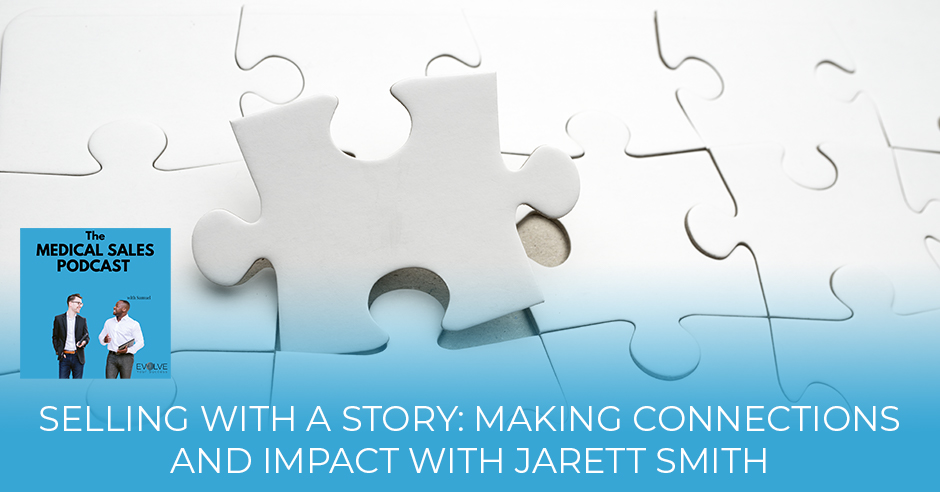
Where many medical sales representatives fail to remember when selling is how medical service providers are, at the end of the day, still human. It can be so easy to fall trap into spitting out the raw factual data that we forget to make that connection that can impact many lives. In this episode, Samuel Gbadebo interviews Jarett Smith, the Head of Sales at Shadowbox, to share some strategies and insights that you can use in your medical sales position, particularly on selling with a story. He also takes us into his journey from being a soccer coach, turned pharmaceutical sales rep, technology health rep, and into a leader of sales—imparting great pearls along the way about the role of technology in the industry, making that transformation in your career, and how to represent yourself in the interview process.
—
Listen to the podcast here
Selling With A Story: Making Connections And Impact With Jarett Smith
Thank you for joining us on The Medical Sales Podcast. I want you to take time to know our guest. It’s a short interview, but it’s a guest that had one interesting career. He started as a soccer coach, turned pharmaceutical sales rep, turned technology health rep, turned leader of sales in a technology company. When you read the story, it’s fascinating how he went from one step to another. He touched on some things that I hope resonates with everyone. He dropped some pearls that I want everyone to know and apply to everything they’re doing especially those that are working to get into a medical sales position, whether it be pharmaceutical, medical device, or another related medical sales position. Enjoy the interview. It’s with the Jarett Smith.
—
Jarett, welcome to The Medical Sales Podcast. Thank you for joining us.
It’s my pleasure. I’m glad to be here.
You are the Head of Sales of Shadowbox and that is a technology data integration company. What’s interesting about your career path is you started in the medical sales field with Merck. Right off the bat, tell us a little bit about what you were doing in college and what drove you to even get into medical sales and let’s talk about your career.
Going off to college, I was never wanting to plan things out. Where I am now, it was strictly through looking for environments that were going to challenge me and help me grow. In college, I played soccer. I majored in Spanish with a focus on International Business. I had no idea what I wanted to do after college. I stuck with the game of soccer and became the coach at the collegiate level, as well as the Olympic development level. I jumped after about six years of coaching in college and spending two weekends on the road recruiting. I said, “I’ve had enough of this lifestyle.” I started to talk to my former teammates. I had a couple of former teammates that were also roommates that were in the pharmaceutical sales. They said, “You’d like it because it’s challenging. You’re out talking to people every day. It’s something different every day.” I decided to use the network of people that I knew and jump into the interview process. That was interesting in itself.
It's who you know first and what you know second. Share on XHow was that interview process for you? Was it relatively easy to get a position because of your network of friends that were already in there or would you say it took you awhile?
Everyone’s heard the adage, “It’s who you know first, what you know second.” I was looking at the time my wife played soccer with someone who had a friend that was a manager. We were in the same social circles. We were introduced and that went through the interview process, which was probably one of the longest intensive interview processes that I’ve at that time had ever gone through. You have to prepare yourself for the questions that they’re going to ask and how you’re going to respond. They’re not always straightforward questions. They’re looking to see how you respond. The intent of the question is always different than how it sounds.
You were in Merck for about three years and you went to a company called EMPI. What was that?
EMPI was a DME company, Durable Medical Equipment. I was looking for something that was a little bit more challenging. It had more of a hunt to kill mentality and drag home. At that time, some sequential industry was changing but Durable Medical Equipment was launching a new product. It’s a new salesforce focusing on providers, primary care internal medicine family doctors. That was appealing to me. It was a challenge to launch a new product and then to get into an office, have a conversation with a doctor and get them to commit to buying something or implementing a system into their practice to help patients.
That was a point in my career when I recognize the fact as I started to work with EMPI that I could make a difference because I had the opportunity to work hands-on with patients. It came from coaching and having the ability to have an impact on somebody’s life. Whether it’s developing them to change and reach their goals, you’re talking about someone’s day-to-day activity. If you can improve on that, if they’re going through chronic pain and improve their life, that had a significant impact on me. That’s why I got into healthcare.
No matter what industry, technology is going to have a significant impact and a role in it. Share on XIt sounds like for you it was very rewarding. You did that for about two years. I’m assuming you got close to a lot of patients. You got to see that patient impact.
When you have the opportunity to interact with patients, you also have the opportunity to see what doctors truly go through on a day-to-day basis. Doctors are playing this role especially when their patients are dealing with physical ailments. You don’t realize how much it affects people psychologically. The best doctors that I saw were ones that took time and empathize with their patients and what the patients were going through. I learned that there was a whole other facet of healthcare that doctors have to go through. It’s not strictly medical training. There’s a social psycho component to it that the good ones key into.
When you notice that and you noticed the difference in providers, how did that change how you approach them as far as selling your service and your product?
That question is probably one that is absolutely instrumental in how you sell. You have to remember that many times we put providers up on this high pedestal where they’re not human. That’s a big mistake because they are human. They’re married. They have kids. They have brothers and sisters. They have parents. While you’re selling, if you can tap into the human component about how your service or how your product is going to truly impact the lives of the patients that they’re treating by telling stories, not spitting out the raw factual data. It’s telling them stories that you’ve heard from other doctors or that you’ve seen about the impact of your product or service. That has the ability to touch a much bigger cord than the accuracy of whatever you’re selling.
That’s important. You’re saying pretty much to cite examples of their peers and how they found value in whatever you’re selling. Making that case with your new providers.

Selling With A Story: Coaches have the ability to impact somebody’s life, whether it’s developing them to change or reach their goals.
I was involved with the product that we were selling had an impact on patient’s daily lives, their activity. Whether they can interact with their family more, doctors see that every single day. When you have a product or a service that a doctor can see that change in their patient, it has an effect on the doctor and the way they treat their patients, even mentally on that provider. It’s how they do their job. If you think about doctors who are constantly seeing patients that are miserable, and now they have a product that can change that, it produces a mental change in that provider. If you can do that as a rep, it rocks your world.
It’s a game changer. EMPI and then you went to Millennium Health. Was that your first leadership role as a regional sales manager?
I started with Millennium as a rep and I covered the state of Tennessee and part of Southern Kentucky. After about a year, we had a successful territory. I had a great partner. He was instrumental in that, a guy by the name of Clinton Corder. To this day, I love that guy like a brother. Whatever we needed to do, we did it. After about a year, the leadership came to me and said, “We want you to do what you guys have done in your territory. We’re going to give you some other states and we want you to do the same thing.”
I took on a management role and he assumed the lead rep position in Tennessee. After another year, as being a regional manager, they gave me a couple more states and made me a director. In that timeframe that I was with Millennium, I feel like I learned what some people may learn in a lifetime because we went as a small startup. We grew to a billion-dollar company. Some of the things we learned the hard way, but it was an amazing experience. Amazing people across the board, from the executive suite to our leadership teams to the reps that we hired. It was an amazing group of people.
Is that where things started to pivot as far as heading towards the technology space? You went to IQuity, Bridge Connector, and then Temp Fusion, LLC. What happened there? When did you see, “I’m going to leave the health and I’m going to get more into technology?”
It's important to have people around you that are going to be honest with you, challenge you, and help you grow. Share on XWhen I left Millennium, I wanted to get out of the diagnostic industry as a whole. I was soaked in it for six years. I wanted to get out of diagnostics, but I wanted to stay in healthcare. A friend of mine pulled me back in with IQuity. They were a much smaller startup lab. At that point I started to see, part of their service and technology was artificial intelligence. I started to realize that no matter what you look at, no matter what industry technology is going to have a significant impact and a role in that industry, you can’t get away from it. For me looking forward, I was late 30s, early 40s and thinking, “What direction do I want my career to go and what is sustainable?” It’s technology. I started to track towards that.
When I left the IQuity, I got called by a recruiter and they were calling me about Bridge Connector. I said, “What company is that?” “They’re an integration company.” I said, “Do you mean like information technology integration?” They said, “Yeah.” I said, “I have trouble turning on my computer in the morning. I don’t know if I’m the right guy for this.” They said, “They’re looking to focus on healthcare. They need someone who understands the inner workings of their target market,” which is customers, doctor’s offices, which I understood. I understood the workflow. I was able to understand the workflow. I was able to painfully, when I say painful, painfully learn integration and how it’s done. I’m still learning. There’s no way to completely learn everything, but I was with them for a while.
It came full circle where I got approached by a guy that I used to work with at Millennium. He was VP of Strategy. He said, “When you and I were there, we were trying to solve problems. One of the solutions I came across was Shadowbox.” I said, “That’s similar to what I was doing.” He’s like, “We’re focused on the lab space right now.” I was like, “You and I both know that we know labs. It took us right back into healthcare, into the lab space, but on the IT side. There was already another guy that was working with him that I knew well, that I communicated with on a daily basis at Millennium. It made perfect sense. I’ll be honest with you, a few years ago, if you told me I was going to be in technology, I would say, “No way, not me.”
That’s crazy how things happen. We’re going to close it up soon. I want to get some pearls from you. I’m going to ask you two questions. The first being, when it comes to being successful, navigating your career, you went from a sales rep in the medical industry to now head of sales for a technology company. What ingredient would you say was necessary that allow you to even make that transformation? What advice would you give to our audience that they could definitely take on and practice in their own careers to give them that same type of opportunity where they can be doing something a little bit different, but still rising the ranks in their career?
I would say that the first thing is you have to be grounded. You have to have accountability to someone, whether it’s God almighty, your family. You have to surround yourself with people that are going to challenge you, that are going to help you grow and be honest with you. I’ve been in situations where I wasn’t doing the right thing. Whether I was learning or I was off-track, it’s important to have people around you that are going to be honest with you, challenge and help you grow. Otherwise, you’re stagnant. If you’re in a group of people that you’re the smartest one in the room, and everyone’s going to argue with you all the time, you’re not in the right place.
If you're the smartest one in the room, then you're not in the right place. Share on XWhen it comes to hiring, you’ve had some experiences with hiring. You were always with sales managers. For our audience that want to get into the medical sales industry or into the health industry, some area, whether it be diagnostic, medical device, pharmaceutical or even technology health, what advice would you give them as far as how to represent themselves in the interview process?
The more that you know, the more that you educate yourself on the market, the company’s target, their product, the better off you’ll be. I have interviewed people and they have asked me to tell them about the company that they’re interviewing for. At that point, the interview is over. You’ve got to do your homework. It shows that you’re vetted. You’re interested in the company that you’re seeking to be employed by, but you have to know who they are. Talk to reps that are already working for the company, get the insight and the feedback. One of the things that a lot of people don’t talk about and a lot of people kid themselves about, this is something that you’re going to pull your blood, sweat and tears into.
If you’re going to be good at it and you’re going to want to improve, exceed and grow within the company, you’re going to have to put blood, sweat and tears in it. You better make sure that you’re passionate about the company and what you’re going to be selling, otherwise, you will fail. These medical jobs, if you want to be a top ten percenter, you’ve got to be passionate about it because that is one of the first things that providers, business to business, that’s one of the things that they see. One of the rules that I always had is, “They might say no, but when I leave that office, I wanted that doctor or that executive to say, ‘That guy is passionate about his product.’”
Jarett, you gave us some pearls. We appreciate the time. Once again, this is Jarett, the Head of Sales of Shadowbox, an upcoming technology data integration company that’s doing big things. Thank you again for coming out and spending time with us.
I appreciate it. Thanks for having me.

Selling With A Story: The best doctors are ones that take their time and empathize with their patients and what they are going through.
—
What I enjoyed about the interview I had with Jarett is his perspective. He started off as a soccer coach at a collegiate level for six years, then became a pharmaceutical sales rep. He then got into pain management and got to see how patients are impacted. He took all of those experiences and applied them to the way he sold and the way he showed up when he would talk to his customers, the providers and it resonates. The power of story and whatever you’re selling, whether it’s selling something, selling a product, selling a service or selling yourself on getting the opportunity to work in a new company that you want to join.
For those of you, for example, that want to enter medical sales, when you can position your value, your products’ value or services’ value on the impact it’s going to make in the form of a story, it’s powerful. It resonates. It sticks in the minds of those that hear it. Jarett touched on that. He got into how deep that goes when someone hears these things through a story. For example, if you’re selling a service or a product, I want to challenge you to sell with a story. A lot of you are doing this already. I know your top ten percenters are definitely doing this, even those that are going for medical sales positions. I want to challenge you to sell a story, but here’s the real challenge.
I want you to go to the EvolveYourSuccess.com website, go to the Podcast page. There’s an option to leave a recording there. I want someone to get on that page and leave a recording of how you use story into something you were selling, whether it be a service, a product or yourself for an opportunity to work with the company. I want to hear how you story. What I’m going to do is take that recording. I’m going to sample it and play it on one of our upcoming episodes. Again, thank you for tuning in to The Medical Sales Podcast. It was great talking to Jarett and knowing his insight and how he took the breadth of his experiences and applied it. Another thing that I want to highlight, he did talk about he thought about the future and where everything’s going. He didn’t know what he would be getting into with technology. He knew that he wanted to be there.
It goes back to when he was a soccer coach. He didn’t know what he’d be getting into with pharmaceutical sales, but he knew he had a lot of friends in it and wanted to be there. I liked the theme that kept recurring in his experience. It speaks to, you don’t always have to know exactly what you’re going to do next, but you do want to know the direction you want to go. Be ready to jump in. If you’re passionate about who you want to impact, you understand why you want to do it, and you can communicate how you bring value through story, then you’re going to find an opportunity. Someone’s going to give you an opportunity. It can change your entire trajectory and put you in a different space that you never thought you’d be in, and have you loving it.
Jarett highlighted that with his experience. Again, visit EvolveYourSuccess.com, leave a record on the Podcast page. For those of you that are looking to enter the medical sales industry, enter pharmaceutical sales and medical device sales, enter genetic testing, diagnostic lab sales, visit EvolveYourSuccess.com and check out the homepage and take the assessment. That assessment can give you a nice little snapshot into where you are in your medical sales pursuit for a sales position. Thank you again for tuning into The Medical Sales Podcast. I look forward to bringing more guests with more amazing stories. I hope you stay tuned.
Important Links:
About Jarret Smith
 15 years of success leading sales volume and revenue growth in competitive markets as a Sales Leader. Proven talent for developing and implementing sales and promotions strategies to successfully penetrate competitive markets, increase market position, and drive sustainable growth through changing market conditions.
15 years of success leading sales volume and revenue growth in competitive markets as a Sales Leader. Proven talent for developing and implementing sales and promotions strategies to successfully penetrate competitive markets, increase market position, and drive sustainable growth through changing market conditions.
Adept at recruiting, training, and developing top sales and service talent to achieve individual and team goals by mastering proven and innovative sales methods. Enthusiastic collaborator who has worked with diverse departments to create and execute targeted sales strategies and growth initiatives.
Love the show? Subscribe, rate, review, and share!
Join the Medical Sales Podcast Community today:
